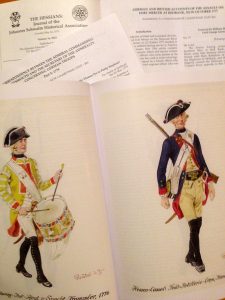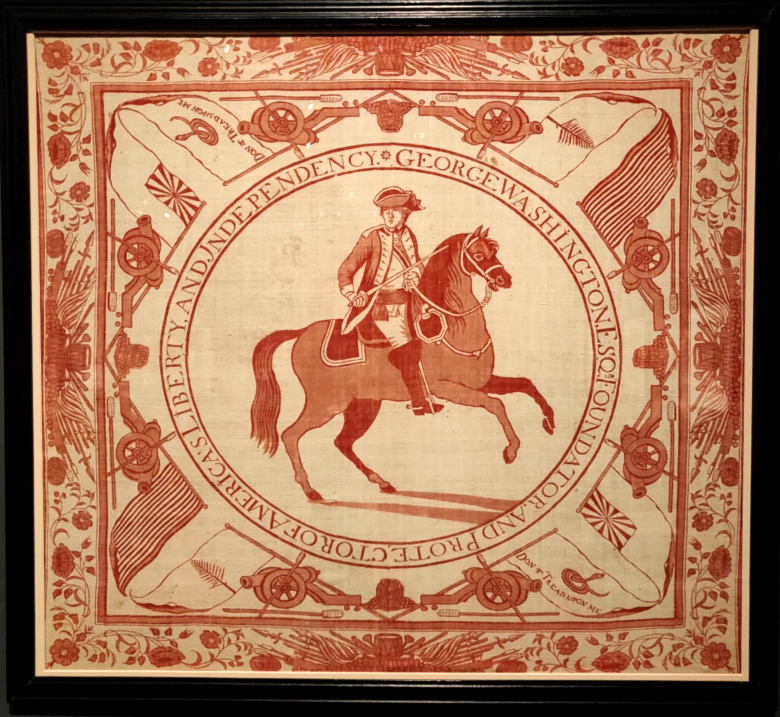In recent decades, scholarship on the American Revolution has grown to include those largely excluded from the main narrative. Women, Native Americans, those of African descent (enslaved and otherwise), and especially loyalists have all been the subject of the some of the best and most recent studies. For example, Kathleen duVal’s Independence Lost: Lives on the Edge of the American Revolution tells the story of how the Revolution affected those who literally lived on the fringes of the conflict, such as natives and Africans living in the Gulf Coast,[1] and how they were among the conflict’s losers. In contrast, the “Hessians,” Germanic state soldiers transported to America to fight alongside the British, might make an interesting contrast. For many, the conflict was a way off a continent that held less opportunity and the gateway to a better life.
 If Americans know anything about the Hessians’ role in the Revolutionary War, it’s likely their role as the losers in the battle of Trenton. As most Americans know, even in this day and age when American history has been subsumed as merely one of the “Social Studies,” on Christmas Day, 1776, George Washington led the American army in the now famous “Crossing of the Delaware River” to attack a large Hessian contingent camped in Trenton, New Jersey. Achieving complete surprise, the Americans captured almost all of them with virtually no Patriot casualties. And it is largely as the foils to this great Patriot victory that Hessians are known in America today.
If Americans know anything about the Hessians’ role in the Revolutionary War, it’s likely their role as the losers in the battle of Trenton. As most Americans know, even in this day and age when American history has been subsumed as merely one of the “Social Studies,” on Christmas Day, 1776, George Washington led the American army in the now famous “Crossing of the Delaware River” to attack a large Hessian contingent camped in Trenton, New Jersey. Achieving complete surprise, the Americans captured almost all of them with virtually no Patriot casualties. And it is largely as the foils to this great Patriot victory that Hessians are known in America today.
Much less understood and appreciated is the large extent to which those German born soldiers decided that America was a better home for them than their native land, and the degree to which many stayed, putting down roots that continue to this day. For their descendants interested in learning more about their own heritage, or historians and others just interested in further exploring the role that Hessians played during the Revolution, the Johannes Schwalm Historical Association provides great resources for further study.
The Society’s website and its publication The Hessians are its main educational resources. For genealogical and ancestry purposes, the Association’s website[2] provides particularly valuable information. In addition, the Association can help with research on “a Hessian or any German Auxiliary soldier who fought for England in the Revolutionary War and remained in North America.” It maintains registries of researched and partially researched individuals, and maintains bulletin boards for those seeking further information.
For many just interested in learning more about the Hessians’ role in the war, the association’s high quality, glossy annual journal contains articles mostly in English but also some in German.[3] Each issue contains a small number of plates of Hessian soldiers. The articles are scholarly, many of them written by PhD historians. They cover individuals, units, battles and Hessian practices. Their relationships with the British army and navy are explored in such articles as “British Employment of German Troops in the War of American Independence: Use or Misuse?” and “Sailing in a Volcano: German Soldiers and a Royal Navy Fireship.” Many of the articles are translated first-hand accounts, journals and letters by officers and soldiers written during their service in America, with extensive annotation. Book reviews and bibliographies also appear in each issue. News primarily of interest to those interested in family events and news is also included in each issue. The contents of each annual issue can be seen on the web site, and back issues are available for purchase.
 In all, the Schwalm Association will appeal primarily to those whose ancestors fought as Hessians during the American Revolution. But their website and The Hessian are also good resources for scholars and others interested in learning more about the Hessians as individuals and as a whole, their role during the War, and how the War affected them. For anyone looking to explore the Hessians as the next group whose story has not been fully explored, the Association will be a great resource.
In all, the Schwalm Association will appeal primarily to those whose ancestors fought as Hessians during the American Revolution. But their website and The Hessian are also good resources for scholars and others interested in learning more about the Hessians as individuals and as a whole, their role during the War, and how the War affected them. For anyone looking to explore the Hessians as the next group whose story has not been fully explored, the Association will be a great resource.
[1] Random House, 2015. Reviewed in the Journal of the American Revolution here: https://allthingsliberty.com/2015/09/independence-lost-lives-on-the-edge-of-the-american-revolution/.
[2] http://www.jsha.org/.
[3] Each volume contains a good deal of information about the extended Schwalm family as well, which I presume would be mostly of interest to family members.









2 Comments
Alec, thanks for the positive comments about JSHA and our journal. The 2018 edition was our largest ever and included strategic vision of where we are going as we ramp up to USA 250. It also gave significant examples of history articles of Schwalm descendants in the Civil War, WW II and Vietnam. These were done to model what we want from other descendants (I have two in the gin mill for 2019) as well as my own Desert Storm story. It links the actions of a descendant of Johannes (a POW) with caring for Iraqi POWs in 1st Marine Division in 1991. We also are planning a move to supplement our print publication with significant increases in digital content. We also just reproduced a Hessian Diary that was out of print and are looking to do the same with our other proprietary content. vr, Ross Schwalm, President JSHA
My Gr Gr Gr Gr etc grandfather was Johannes H Schwalm born around 1688 near Schleswig Holstein, Germany and immigrated to Switzerland then to Berks County, Pennsylvania in 1728. Would he be included with this group of Hessians fighting in Revolutionary War?